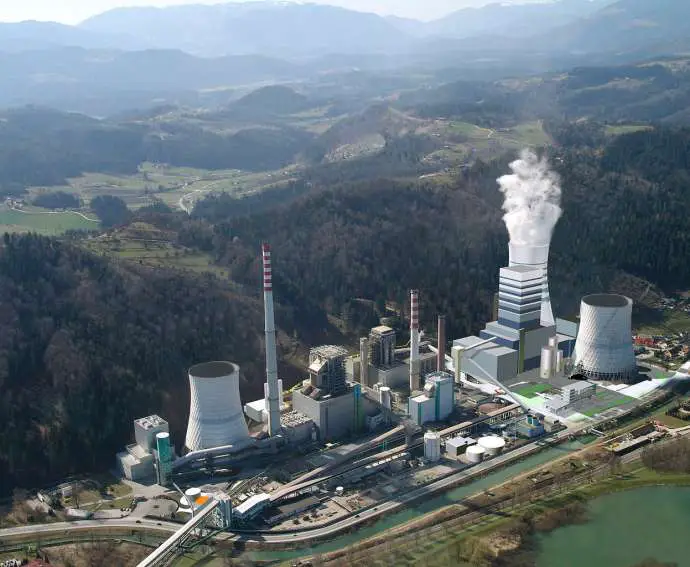STA, 20 May 2021 - After a decade-long investigation, corruption trial will start in the case of a EUR 1.4 billion generator project at the Šoštanj coal-fired power station TEŠ. Twelve individuals and two legal entities face charges on multiple counts. The arraignment is scheduled for Friday.
The defendants in the case face 24 counts in the indictment for irregularities in the construction of unit six at the TEŠ plant, known as TEŠ6. The alleged wrongdoings include abuse of office or breach of trust in business, money laundering and aiding and abetting.
On Friday, the first pre-trial hearing will be held in the Celje District Court, whereas the second is expected on 15 June.
Investigators started their inquiries in the case in 2010 with first house searches conducted in June 2012. A criminal complaint was filed in October 2014.
A month later, the prosecution filed a motion with the Celje District Court to launch an investigation against ten suspects, including Uroš Rotnik, who served as TEŠ director between 2003 and 2010, a period when the decision to build the new, 600-megawatt generator was made.
It then took years for a decision to open the investigation to be issued. Moreover, the decision only became final in 2018 when the appeals of the accused were rejected.
The investigators unearthed an alleged bribery scheme that caused damages exceeding EUR 250 million. The price tag of the TEŠ6 project had escalated to EUR 1.41 billion allegedly due to poor management, even though the initial estimate was EUR 650 million.
The indictment is one of the longest in Slovenia's history, numbering 1,332 pages and 43,000 attachments. The defendants face a prison sentence of up to 20 years.
The indictment was served on all the accused in the case last year after months of delays and attempts to deliver the document to all of them, twelve Slovenian and foreign individuals, a Slovenian legal entity and a foreign legal entity.
The prosecutors brought the indictment against Rotnik, the key suspect, as well as Bojan Brešar, the former head of the TEŠ6 project, lobbyist Peter Kotar and his consulting firm Sol Intercontinental, Boštjan Kotar, director of CEE, the company that drew up the TEŠ6 main call to tender, and TEŠ employees Jože Dermol, Darko Weiss and Miran Leban.
Among those charged are also Frank Lehmann, former power plant sales manager at the Alstom Power group, Josef Reisel, former Alstom Austria executive director, financial expert Bogdan Pušnik, who allegedly helped Rotnik hide the origin of his assets, tax adviser Darko Končan and French multinational Alstom Power that is now part of the US corporation General Electric.
Rotnik allegedly made sure that Alstom bagged unlawful financial gains worth more than EUR 284 million. According to unofficial information, the former TEŠ chief executive had EUR 14 million in assets in 2013, which he had to account for with the Financial Administration. He is also said to have received EUR 870,000 in commissions at the minimum.
Rotnik was arrested in November 2014 together with Pušnik, the former head of the Medvešek Pušnik brokerage, on suspicion of a money laundering scheme as the pair allegedly made bogus loan contracts. Contrary to Pušnik, he was detained, but left the detention in December 2014 when the Supreme Court ruled that the decision on detention was unlawful.
In June 2015 Rotnik was again interrogated by the court on alleged wrongdoings not merely in the construction of TEŠ6 but also regarding units 4 and 5.
In 2016, he was also subjected to a parliamentary inquiry that sought to establish the political responsibility for the TE6Š fiasco. He told the inquiry that the project was transparent and had the green light of relevant decision makers in the country.
State Prosecutor General Drago Šketa said in May 2020 that the indictment comprised three parts. The first alleges irregularities in terms of the technological equipment of unit 6 worth EUR 250 million, the second deals with allegations about reconstructing the unit five boiler and the third focuses on the systemic equipment for units 4 and 5 worth EUR 280,000.
Šketa said that the prosecution completed the indictment a year after the investigation was finished. The investigation had been beset with delays as the pace of the proceedings at the Celje District Court had been too slow, he noted.
Former Justice Minister Goran Klemenčič had ordered the Celje Higher Court to compile a report due to the delays in the case. The findings blamed the district court rather than the police or the prosecution for the situation.
As key reasons for the delays the report cites absences of investigating judges due to sick leave, hearings of "questionable applicability", the fact that judges were overloaded with other less pressing cases, failure to ask for international legal aid and delays in response to appeals for urgency.
The TEŠ case, one of the longest-running criminal cases in Slovenia, becomes statute-barred in 2030.






